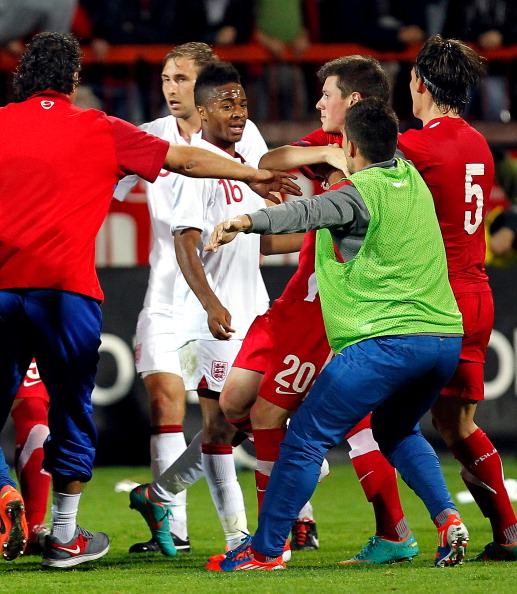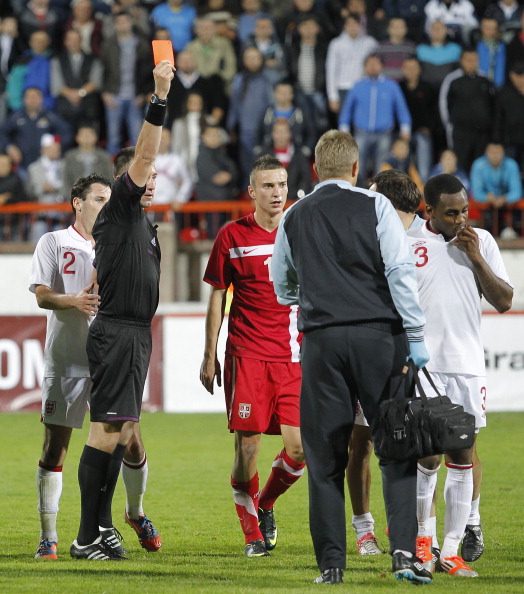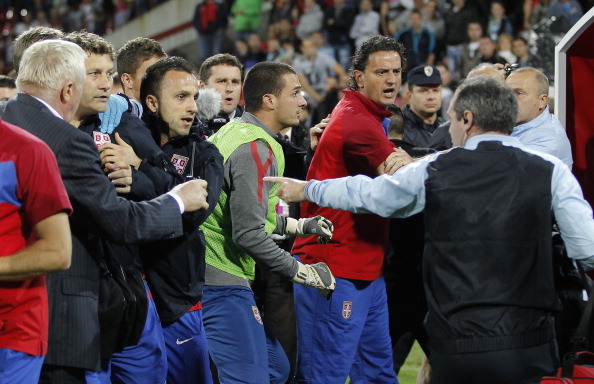By Andrew Warshaw
December 14 – Despite UEFA President Michel Platini’s oft-quoted insistence that his organisation favoured a zero tolerance approach to racism, Serbian authorities were handed a series of less than drastic sanctions today in the wake of their fans’ behaviour at the now infamous under-21 fixture against England in October.
Serbia was ordered to play one home under-21 game behind closed doors and were fined €80,000 (£65,000/$105,000) as a result of the mass brawl that ensued between players and officials after the final whistle, prompted by persistent racist abuse from the stands during the explosive playoff fixture in Krusevac.
Four Serb players and two members of their coaching staff were banned for between two and four games but, alarmingly, not once in UEFA’s statement outlining the penalties imposed by its disciplinary panel was the word racism actually used – despite the chanting being clearly heard by millions of television viewers.
Instead UEFA said the sanctions were “due to the improper conduct” of both Serbian supporters and players.
In a strongly worded statement, English Football Association (FA) general secretary Alex Horne reacted by declaring his federation was totally dissatisfied by the level of punishment.

“We are disappointed with the sanctions levied by UEFA with regards to the racist behaviour displayed towards England’s players,” Horne said.
Horne had warned shortly after the match that England would consider refusing to play in Serbia as a result of “racial abuse, violence and threatening behaviour”.
FA chairman David Bernstein subsequently met with Platini to discuss the matter and even British Prime Minister David Cameron waded into the debate.
“Let’s be clear, racism is unacceptable in any form, and should play no part in football,” said Horne following today’s judgement.
“The scenes were deplorable and we do not believe the sanction sends a strong enough message.”
He was backed by Sports Minister Hugh Robertson, who had written to Platini demanding tough action.
Robertson, who this week attended a forum in Qatar about how sport could be used as a tool for positive change, said: “I am disappointed in the punishment that has been awarded to the Serbian FA given the widespread racist abuse that England’s under-21 team suffered that night.
“Racism is completely unacceptable and we need tough sanctions to help combat it.”
The ugly scenes that erupted on October 16 followed England gaining passage into next year’s under-21 finals thanks to a last-gasp goal that secured a 2-0 aggregate playoff victory.

England defender Danny Rose (pictured above), who claims he was constantly verbally abused, was shown a second yellow card and sent off after he kicked the ball into the crowd at the final whistle – sparking the mass brawl that involved both management teams.
Disciplinary proceedings against the English FA were dismissed but UEFA’s message that the hosts alone were not responsible for the fracas was manifested by the decision to also ban Steven Caulker for two games and Tom Ince for one which means both England players are unavailable for crucial matches at next summer’s finals in Israel if selected.
Those rulings drew anger from Horne who said: “It is the FA’s vehement belief that its players and staff acted correctly in the face of provocation, including racist abuse and missiles being thrown.
“We are therefore surprised to see that two of our players have been given suspensions.”
Serbian officials promised to take measures to prevent similar incidents in the future but were pleased UEFA had not “succumbed to pressure.”
“This incident and today’s measures represent the last warning for all of us who work in Serbian football, including coaches, players and fans,” said Zoran Lakovic, general secretary of Serbia’s FA.
“I remind everyone that we are under special UEFA scrutiny and even the smallest next mistake could lead to rigorous punishment.”
Inferring his country, which has been in trouble before with UEFA, had got off lightly, he added: “Considering what punishments were proposed which were drastic, we conclude that we passed quite well.”
Contact the writer of this story at zib.l1744955389labto1744955389ofdlr1744955389owedi1744955389sni@w1744955389ahsra1744955389w.wer1744955389dna1744955389

